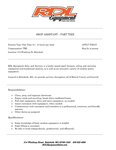ARPA funds present opportunity to address food insecurity through Retail SNAP Incentive Program
The number of families and children going hungry in Rhode Island has reached a crisis point. As Rhode Island leaders debate how to allocate $1.1 billion in federal funds received through the American Rescue Plan Act (ARPA), we have a generational opportunity to address this crisis head-on.
According to the Rhode Island Community Food Bank, one in four local households are experiencing hunger. This marks the highest hunger rate Rhode Island has reported in decades, and puts us near the bottom of the nation when it comes to food security. The economic impact of the COVID-19 pandemic has only exacerbated this unfortunate trend, leading to a 65 percent increase in local households that rely on the federal Supplemental Nutrition Assistance Program (SNAP) to put food on their tables.
While SNAP benefits are certainly crucial resources in Rhode Island’s most vulnerable communities, we know these dollars can only go so far to truly address the realities of hunger. The average cost of a healthy, nutrient-rich meal, according to Feeding America, is around $3.23. The discrepancy between benefits received and the real cost of nutritious food is forcing far too many families to stretch their budgets by opting for cheaper, unhealthy options. As rapid inflation leads to fresh produce becoming even more expensive, this problem is trending toward getting worse before it gets better.
That’s why we are urging Governor McKee and Rhode Island leaders to allocate $25 million in ARPA funds to create what’s known as a Retail SNAP Incentive Program on a statewide level. The program we and other elected leaders and public health advocates across the state are supporting would provide SNAP beneficiaries in Rhode Island with a 50 percent discount on fresh fruits and vegetables when they pay with their benefits in retail settings. In essence, this program would double low-income individuals’ purchasing power in produce aisles across the state, directly leading to increased sales for grocers and significantly improved health outcomes for Rhode Island’s underserved populations.
There is an abundance of evidence that shows financial-based incentive programs like the one we are proposing are extremely effective in reducing hunger and increasing consumption of healthy food items. On a local level, Retail SNAP Incentives aren’t available in retail settings, where the majority of SNAP beneficiaries shop, but variations of them are offered, and widely used, across Rhode Island through initiatives like Farm Fresh Rhode Island’s Bonus Bucks program and Rhode Island Public Health Institute’s Food on the Move program. Across the border in Massachusetts, legislators have committed once again to fund the statewide Healthy Incentives Program (HIP), which, since its launch in 2017, has reached nearly 100,000 families; encouraged more than $26 million in produce sales; and led to an eye-popping 1,250 percent increase in SNAP sales at participating markets.
Similar programs have been launched in California, Colorado, Hawaii, Iowa, Michigan, North Carolina, New York, Texas and Washington – and in every instance, in every corner of the country, the impact is clear: When individuals and families are given the opportunity to make healthier choices, they take it. SNAP beneficiaries buy more fruits and vegetables, improving their overall health and well-being, while at the same time, farmers, food distributors, grocers and the overarching economy all benefit from the increased purchasing power of tens of thousands of new customers.
It is past time to implement a statewide, long-term plan to reduce hunger in our communities, and the introduction of a Retail SNAP Incentive Program is a good first step. The availability of $1.1 billion in federal ARPA funds, a pool of resources earmarked to address “immediate needs” in Rhode Island’s post-COVID recovery, presents an ideal opportunity for Rhode Island to fund the launch stage of this program and help our neighbors afford the fresh, healthy food their families need and deserve.
Once it gets off the ground, we are confident the impact this program will have in Rhode Island’s most vulnerable communities will speak for itself.
Sen. Valarie J. Lawson, a Democrat, represents District 14 in East Providence. Dr. Amy Nunn is the executive director of the Rhode Island Public Health Institute.

















Comments
No comments on this item Please log in to comment by clicking here